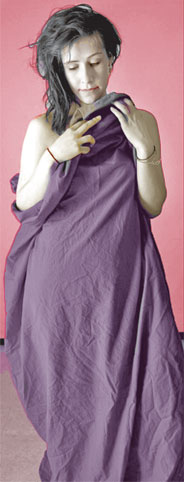Women’s beauty and body image projected in media
By Lionel Wijesiri
|

Women spend endless rupees on trying to perfect themselves
|
Recently, I had the opportunity of watching a documentary film titled
Miss Representation. The film’s goal is to encourage young people to
think critically about how women are represented in the media. Spliced
in were interviews of scholars pointing out the absurdity of these
portrayals. The director recounts how, as a new actress just starting
out, she was advised by her agency to omit from her resume the fact that
she had an MBA degree from Stanford. It might limit her roles if she was
thought of as “too smart”, her manager told her. What a strange
perception!
|

The portrayal of women in the media |
Miss Representation presents a thought-provoking and sobering case
for change. In the world we live in, full of dangers both known and as
yet undreamed of, is it right that women spend more on body image
products and plastic surgery than they do on higher education? Is it
right that the media machines we have created and condoned can engage in
the “symbolic annihilation” of one of our great resources - our young
women?
Glamour
Today’s media comes in many forms, television, radio, newspapers,
movies and advertisements and it is so intertwined in our lives that we
do not truly comprehend on a conscious level how much influence it
really has over us. Some of the images and messages we see and hear can
be both positive and negative.
More often than not, we are exposed to images that are so unrealistic
and unattainable by the average person that we become discontented with
our lives and ourselves. Images of luxury homes, cars, glamorous clothes
and glamorous body images make us more self-conscious of how we live and
how we look.
Beautiful, attractive, rebellious, dreamy, exciting - these are some
of the qualities of women as presented in our mass media, drama series
and satellite television channels. However, do these qualities represent
the real female? How does this stereotypical image of the female affect
the family? Is this really the society’s viewpoint or the viewpoint of
the mass media that totally contradicts reality? These are the questions
that need to be answered.
Family break-up
Recent media studies show that video clips and advertisements exploit
the woman’s body for the benefit of commercial business and product
advertising. The worst thing is that video clips exploit femininity in
spreading adultery and immorality because it only focuses on the
sexually-arousing parts of a woman’s body and mostly depicts her as the
sweetheart who flirts with her lover.
With regard to drama series, many of them present the woman as a
person who always suffers from problems because of being either a mother
or a wife. In this way, the two main roles of a woman in this life are
presented as the causes of her misery. The solution for these problems,
as presented in these drama series, is that a woman should rebel against
these two roles and against her responsibilities. Additionally, it is
noticed that many of the drama series urge women to be rebellious and
belittle the effort and role of housewives.
The female pattern presented by the mass media today is difficult to
be followed. It even leads to increasing the rate of family break-ups.
Always presenting women who look elegant and attractive in their full
adornment and best clothes in the mass media is the cause of many
husbands losing interest in their wives.
In reality, only a small percentage of women look like this and most
wives cannot attain the beauty of the women presented in the media. This
is the cause of problems between spouses as the husband starts feeling
dissatisfied with the beauty of his wife.
Rivalry
On one hand, it seems that the mass media speaks about women rather
than allowing women to speak for themselves. The other shortcoming in
the performance of mass media in solving women’s issues is the
negligence of religion and culture and adopting a rivalry and
conflict-oriented approach as if there is a battle going on between men
and women with some people supporting women against men and vice versa.
The media approach is not supposed to be provocative, as the whole
family is in the same boat, that is to say, if it sinks it will drown
both the man and the woman, and likewise if it is saved, it will save
them both.
Also, the mass media pays exaggerated attention to certain
professions such as actresses, sportswomen and businesswomen at the
expense of female teachers, researchers and scientists.
Pressure
This trend focuses on a concept known as “self-objectification” where
women learn to think of and treat their own bodies as objects of others’
desires. Sexually objectifying images of women can be regularly viewed
across all types of media that teens consume, from their music and the
barrage of images available via the Internet to TV programs and movies
they watch and the magazines they read.
Women, having internalised how an observer views their physical
selves, learn to treat themselves as objects to be looked at and
evaluated for their appearance.
According to the Objectification Theory, the girl adopts a
third-person perspective on her physical self, constantly assessing her
own body in an effort to conform to modern “sexy” standards of
attractiveness. This standard can lead a woman to evaluate and control
her body more in terms of sexual desirability to others than in terms of
her own desires, health, wellness, achievements or competence.
The pressure on women to look and behave in certain ways is so deeply
ingrained in our psyches that it’s easy to overlook the impact mass
culture has on how we feel about ourselves and our bodies. Watching
television, reading magazines and newspapers, surfing the Net, we are
bombarded with airbrushed images of perfect beauty and thinness.
Inevitably we absorb the relentless message that such beauty is the
norm, and is achievable, if only we would … use this makeup, remove that
hair, buy the right clothes, reshape that body part.
Many of the women know that the unspoken promise - use our product
and you will get the love, the happiness, or the success you want - is a
lie. Many of them have had long, ongoing struggles to accept their
bodies as they are and to make peace with, and possibly even celebrate
food. Still, there are times their insecurities and self-loathing
outweigh their feminist sensibilities, and they need reinforcements to
remind them that looks don’t make the woman.
The media industry, as a whole, is a multi-billion rupee industry,
and the fact that women are constantly being told that they need to look
better, feeds into the bottom line of these industries selling the
perfect image.
It is a lose-lose situation for the Sri Lankan female. While women
spend endless rupees on trying to perfect themselves, the companies that
create the fantasy of the ideal female body, just keep getting richer.
Reality
I believe women should be accepted for who they are without trying to
fit them into some ideal that a male-dominated company has created to
expand their profit margins.
Unfortunately, we as a society have bought into what the media have
been selling and there seems to be no turning back. Focusing on the
issues that have arisen from these media images and the damage it has
caused our female population, in particular our young ones, will help us
to learn about ourselves as a society and as a human race. It may also
help us understand our expectations for one another, in a society where
looks and image have become the most important part of the human
existence.
If we could start thinking about what is reality as a collective
society, then maybe we can also accept that reality without constantly
trying to change it.
We need to accept people for how they look, no matter what they look
like without trying to live up to some unrealistic image in the media.
|



